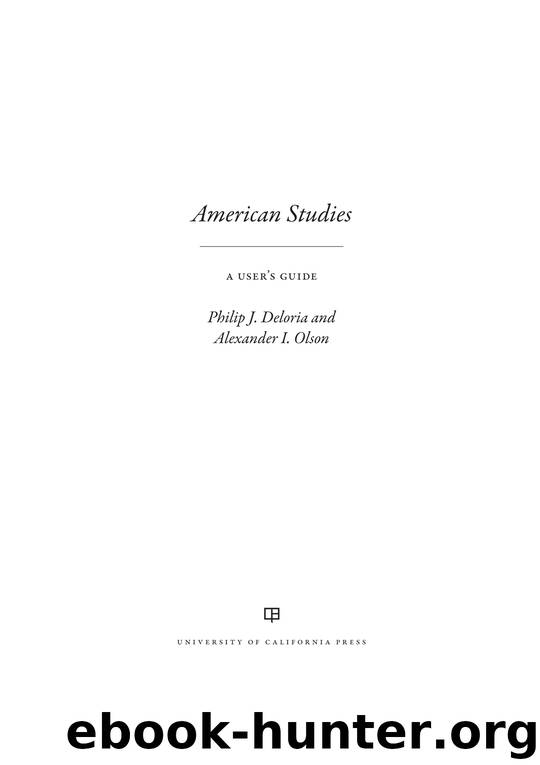American Studies by Deloria Philip J

Author:Deloria, Philip J.
Language: eng
Format: epub
ISBN: 9780520296794
Publisher: University of California Press
Most of what ails our criminal justice system lie[s] in unwarranted certitude on the part of police officers and prosecutors and defense lawyers and judges and jurors that they are getting it right. That they are simply right. Just a tragic lack of humility in everyone who participates in our criminal justice system.1
Strang’s point is, at its core, methodological. Each of the many archives produced for a given investigation offers the tempting shortcut of confirmation bias. In other words, it is easy to only look for sources that support what you already believe is right. This does not only apply to criminal investigations but to any context—including American Studies—in which the functions of curation and analysis are carried out by the same entity.
In many humanities disciplines, curation is handled largely by institutions such as libraries, special collections, and historical societies, which serve as an important check on the dangers of confirmation bias. These collections are presumed to be assembled without regard for the expected conclusions of a given research project. Nevertheless, institutional collections are still a product of creative labor. Curators must make difficult choices about how to assemble and organize materials based on assessments of intellectual significance. In this sense, we are all curators. Both librarians and researchers are in the business of making decisions about how to assemble texts and other data in order to draw meaningful conclusions. Even a decision to focus exclusively on an individual text has a hidden curatorial dimension, insofar as it involves the purposeful exclusion of other texts.
One of the long-standing attractions of American Studies has been the ability to build one’s own archive. Earlier generations of scholars in the field took great joy in assembling diverse source collections that included literary texts, historical primary sources, technical work from both the social and natural sciences, journalism, art, and more. Archivists from institutions such as the Library of Congress played an active role in the development of the ASA, and one of the field’s early leaders, Henry Nash Smith, went on to become the editor of the Mark Twain Papers at the Bancroft Library in Berkeley, California. The field’s flagship journal, American Quarterly, has a long tradition of announcing and reviewing archives, from microfilm collections in the 1960s to innovative digital archives today.
Though you may not have realized it at the time, we have already given you an extended example of an archive. We’re talking about the mixtapes that we used to frame the historiography of American Studies. You’ll recall that we focused on four of these mixtapes, each one an archive arranged around an important writer:
Download
This site does not store any files on its server. We only index and link to content provided by other sites. Please contact the content providers to delete copyright contents if any and email us, we'll remove relevant links or contents immediately.
| African-American Studies | Asian American Studies |
| Disabled | Ethnic Studies |
| Hispanic American Studies | LGBT |
| Minority Studies | Native American Studies |
Cecilia; Or, Memoirs of an Heiress — Volume 1 by Fanny Burney(31374)
Cecilia; Or, Memoirs of an Heiress — Volume 3 by Fanny Burney(30968)
Cecilia; Or, Memoirs of an Heiress — Volume 2 by Fanny Burney(30922)
The Great Music City by Andrea Baker(22332)
We're Going to Need More Wine by Gabrielle Union(18108)
Bombshells: Glamour Girls of a Lifetime by Sullivan Steve(13138)
Pimp by Iceberg Slim(12971)
All the Missing Girls by Megan Miranda(12810)
Fifty Shades Freed by E L James(12478)
Talking to Strangers by Malcolm Gladwell(11946)
Norse Mythology by Gaiman Neil(11937)
Crazy Rich Asians by Kevin Kwan(8391)
Mindhunter: Inside the FBI's Elite Serial Crime Unit by John E. Douglas & Mark Olshaker(7873)
The Lost Art of Listening by Michael P. Nichols(6508)
Enlightenment Now: The Case for Reason, Science, Humanism, and Progress by Steven Pinker(6432)
Bad Blood by John Carreyrou(5799)
The Four Agreements by Don Miguel Ruiz(5550)
Weapons of Math Destruction by Cathy O'Neil(5072)
We Need to Talk by Celeste Headlee(4902)
